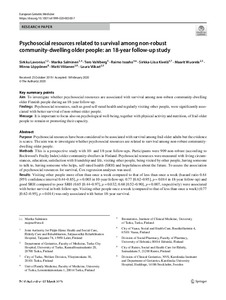Psychosocial resources related to survival among non-robust community-dwelling older people: an 18-year follow-up study
Lavonius Sirkku; Salminen Marika; Vahlberg Tero; Isoaho Raimo; Kivelä Sirkka-Liisa; Wuorela Maarit; Löppönen Minna; Viitanen Matti; Viikari Laura
Psychosocial resources related to survival among non-robust community-dwelling older people: an 18-year follow-up study
Lavonius Sirkku
Salminen Marika
Vahlberg Tero
Isoaho Raimo
Kivelä Sirkka-Liisa
Wuorela Maarit
Löppönen Minna
Viitanen Matti
Viikari Laura
Elsevier
Julkaisun pysyvä osoite on:
https://urn.fi/URN:NBN:fi-fe2021042825656
https://urn.fi/URN:NBN:fi-fe2021042825656
Tiivistelmä
Psychosocial resources have been considered to be associated with survival among frail older adults but the evidence is scarce. The aim was to investigate whether psychosocial resources are related to survival among non-robust community-dwelling older people.
This is a prospective study with 10- and 18-year follow-ups. Participants were 909 non-robust (according to Rockwood's Frailty Index) older community-dwellers in Finland. Psychosocial resources were measured with living circumstances, education, satisfaction with friendship and life, visiting other people, being visited by other people, having someone to talk to, having someone who helps, self-rated health (SRH) and hopefulness about the future. To assess the association of psychosocial resources for survival, Cox regression analyses was used.
Visiting other people more often than once a week compared to that of less than once a week (hazard ratio 0.61 [95% confidence interval 0.44-0.85], p = 0.003 in 10-year follow-up; 0.77 [0.62-0.95], p = 0.014 in 18-year follow-up) and good SRH compared to poor SRH (0.65 [0.44-0.97], p = 0.032; 0.68 [0.52-0.90], p = 0.007, respectively) were associated with better survival in both follow-ups. Visiting other people once a week (compared to that of less than once a week) (0.77 [0.62-0.95], p = 0.014) was only associated with better 18-year survival.
Psychosocial resources, such as regularly visiting other people and good self-rated health, seem to be associated with better survival among non-robust community-dwelling Finnish older people. This underlines the importance of focusing also on psychosocial well-being of frail older subjects to remain or promote their resilience.
Kokoelmat
- Rinnakkaistallenteet [29335]
